Defensemen played a huge role in the New Jersey Devils’ first three Stanley Cup wins. The most legendary Devils blueliners are from that era (1995–2003) but many others have played their way into fans’ hearts.
Let’s start with honorable mentions.
A member of the original Devils – the Colorado Rockies relocated to New Jersey in 1982 – Joe Cirella was a mainstay through some very hard years. He twice led the Devils defensemen in scoring and represented the club in the 1984 All-Star game.
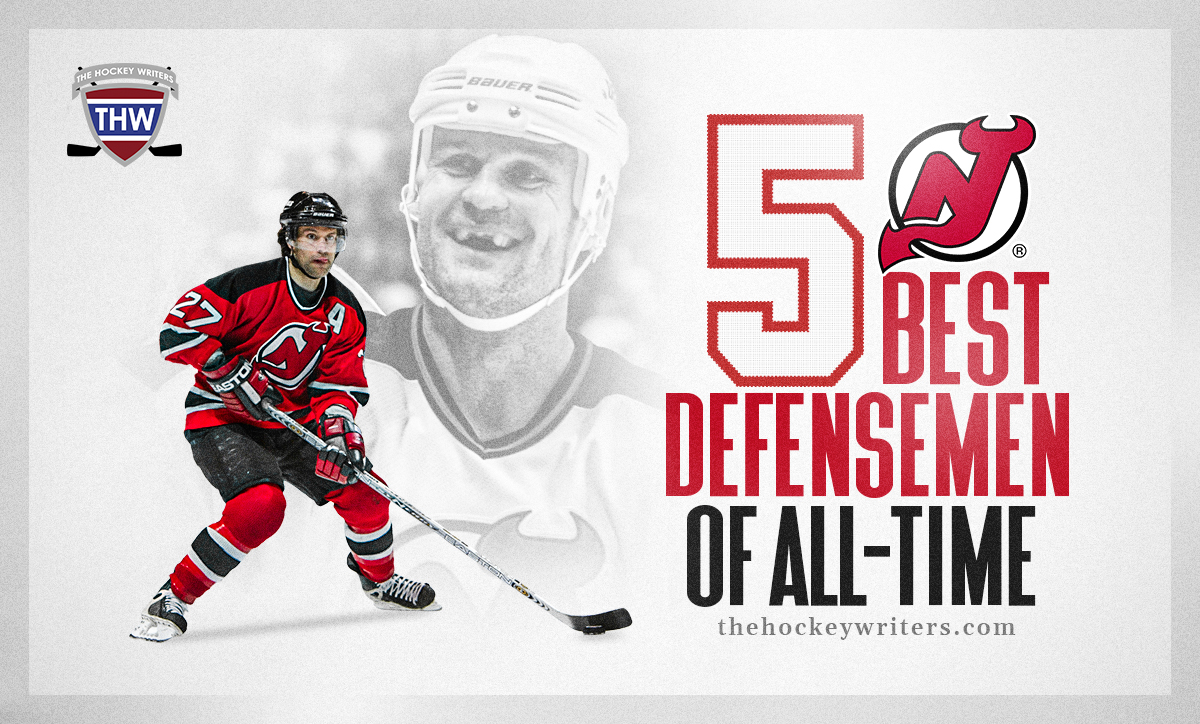
Tommy Albelin, the reliable Swede, won the Stanley Cup with the Devils in 1995 and moved to the Calgary Flames the next season. He returned to New Jersey in 2001 and won his second Cup with the Devils in 2003.
With the Devils, Paul Martin became the definition of a workhorse. The smooth-skating player reached franchise highs in time on ice both in the regular season (23:26 on average per game) and in the playoffs (24:42).
Related: Best Team in Devils Franchise History
A tough stay-at-home defenseman, Colin White played an integral part in two Stanley Cup wins. He ended his rookie season as a Cup winner in 2000 and hoisted the Cup again three years later. After 11 seasons with the Devils, he ended his career with the San Jose Sharks in 2012.
Bruce Driver, a power-play specialist and an exceptional poke-checker, collected 399 points as a Devil in the regular season and added 42 in the playoffs. He debuted with New Jersey in 1983 and played on the Devils’ first Cup-winning team in 1995. After the Cup win, he moved to the New York Rangers and stayed there for the rest of his career.
And now, the top five.
5. Andy Greene
Playing for the logo, that’s what Andy Greene is about. His commitment and willingness to sacrifice his body made him a fan favorite and a leader. In 2015, he became the Devils’ captain. He holds franchise records among defensemen in blocked shots, 1,755, and takeaways, 344; a testament to his value to the team.
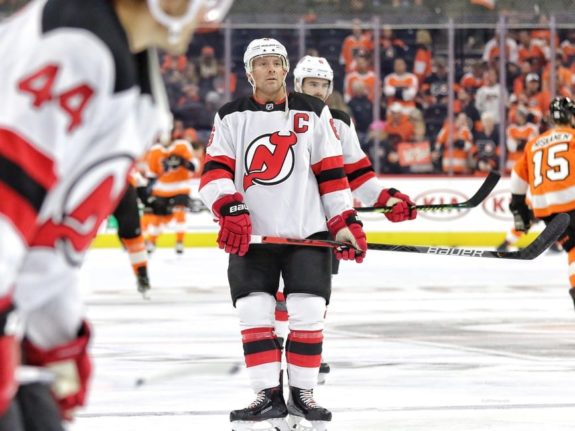
Greene spent the bulk of his first season (2006-07) in the AHL with the Lowell Devils. Gradually, he earned more trust in the organization. In 2009-10, he reached his career-high of 37 points. Two years later, the Devils advanced to the Stanley Cup final – Greene played in 24 postseason games, but New Jersey was defeated by the Los Angeles Kings, 4-2.
Related: Art Ross Trophy | 5 Things You Didn’t Know
Greene had a contract year in 2019-20. The Devils decided to trade him to the New York Islanders eight days before the deadline in exchange for a draft pick and prospect David Quenneville. On Long Island, Greene rejoined GM Lou Lamoriello, a man who was instrumental in making the Devils great during his long tenure there.
“Andy agreed to come to the Island, and we were able to acquire him. I feel very good about it, and very fortunate,” Lamoriello said in a conference call on Feb. 16. Greene made his Islanders debut the next day.
4. Brian Rafalski
In the mid-1990s, the NHL was more physical than it is now, so breaking into the league was hard for the 5-foot-10 defenseman. Brian Rafalski played in Sweden and Finland for several seasons before earning a place on the Devils in 1999.
Related: Top 10 Nicest Current NHL Jerseys
He soon thrived, often paired with Scott Stevens, and won two Cups. His offensive output was crucial to the team’s success; in his best season, he collected eight goals and 55 points. Although he played just seven seasons for the Devils, he’s still the franchise leader in playoff power-play goals (nine) and playoff power-play points (29).
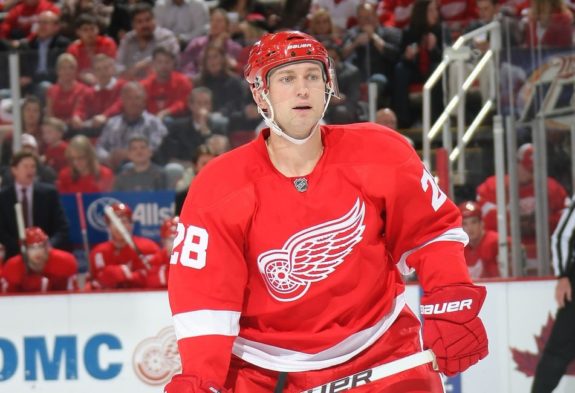
Rafalski’s contract with the Devils expired in 2007 and he signed with the Detroit Red Wings as a free agent. He was born in the Detroit suburb of Dearborn, so it was a homecoming.
“It was a difficult decision leaving New Jersey, the only team I’ve known, but I’m coming home to play for the team I grew up watching,” Rafalski told The Associated Press at the time. “To have this opportunity is a dream.”
You may also like:
- New Jersey Devils 2024 Free Agent Forwards
- Jesper Bratt Has Evolved Into a True Professional for the Devils
- 5 Teams Devils’ Fans Should Watch in the 2024 Stanley Cup Playoffs
- Devils’ Timo Meier: From Zero to Hero
- NHL Rumors: Maple Leafs, Flames, Flyers, Avalanche, Devils
Rafalski won one more Cup with the Red Wings. His career came to an end in 2011. He had one more year left in his contract, but due to knee and back injuries, he decided to call it quits.
3. Ken Daneyko
No player embodies the Devils’ underdog nature like Ken Daneyko. After relocating from Colorado in 1982, the Devils were NHL minnows, who were infamously called a “Mickey Mouse organization” by Wayne Gretzky.
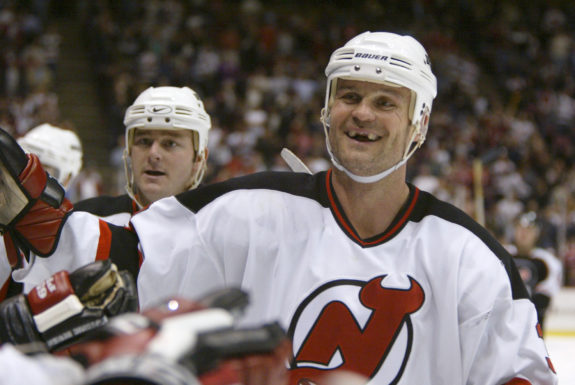
Daneyko joined the Devils in 1983. In his fifth season, the team made the playoffs for the first time. In June 1995, the Devils’ heart-and-soul players Daneyko, John MacLean and Stevens hoisted the Stanley Cup – the NHL underdogs had reached the top.
What Daneyko brought to the team was his reliability – he’s the franchise leader with 1,283 NHL games and 175 playoff games – leadership, and toughness. His accumulated penalty minutes are awe-inspiring: 2,516 in the regular season and 296 in the postseason, both franchise highs.
Daneyko was a lifetime Devil. He only wore the New Jersey colours during his career, which spanned from 1983 to 2003. Only five players in NHL history have had longer one-team careers in terms of seasons. The three-time Stanley Cup winner is still involved with the Devils, as an MSG Network color analyst.
2. Scott Niedermayer
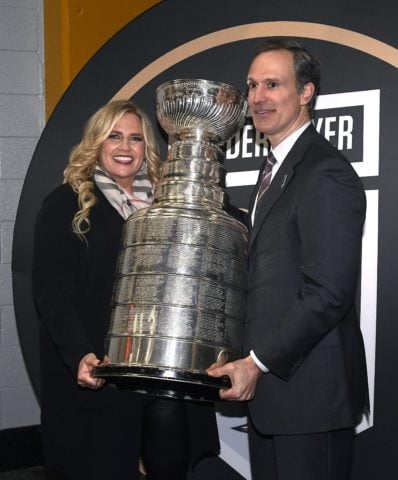
Scott Niedermayer is the best offensive-defenseman in Devils history. He’s the all-time franchise leader in goals (112), assists (364) and points (476) among defensemen and he added 64 points in postseason hockey – a franchise-high as well.
Niedermayer, who debuted in 1991, was a fantastic skater and could carry the puck as well as any of his contemporaries. His skill and hockey sense were top-notch, as was his ability to adapt to the Devils’ style of play. Despite the team’s defense-first approach, he scored 40 points or more in five seasons. He won the Norris Trophy in 2004 as a member of the Devils along with three Stanley Cups.
Some say Niedermayer was a streaky player, but he could turn it into a positive, with the uncanny ability to play his best when it mattered.
The 2004-05 NHL lockout brought Niedermayer’s Devils career to an end. He signed with the Anaheim Ducks as an unrestricted free agent in order to play with his brother, Rob. With the Ducks, he won another Stanley Cup (2007) and was awarded the Conn Smythe Trophy. He retired a Duck in 2010.
1. Scott Stevens
Scott Stevens captained the Devils for 12 seasons, dominating the defensive zone in 956 regular-season games and 153 in the postseason. Often called “Captain Crunch”, he was known for his legendary hits, most notably in open ice.
When he was on the ice, the Devils thrived. He is the franchise plus-minus leader both in the regular season (plus-282) and the playoffs (plus-33), and he could score, with six game-winning goals in the playoffs – the only Devils defenseman to reach that mark. Stevens, Niedermayer, and Daneyko are the only defensemen who were members of all three Stanley Cup-winning teams.
Before his New Jersey days, Stevens spent eight seasons with the Washington Capitals and a season with the St. Louis Blues. Parting with St. Louis was hard for him and his family. When the Devils acquired him in the Brendan Shanahan trade in 1991, at first, he refused to report to his new club.
“The Blues fans were always positive and behind their team,” Stevens told the Star Tribune in 2017 (from “Fate Dealt Wild Assistant Coach Scott Stevens a Short Blues Career”, Star Tribune – 04/20/2017). “My time in St. Louis was short-lived, and it was harder on my wife because we had two young ones at home 16 months apart. We just bought a house, so that was tough. But everything happens for a reason, and it turned out great in New Jersey in the end, obviously.”
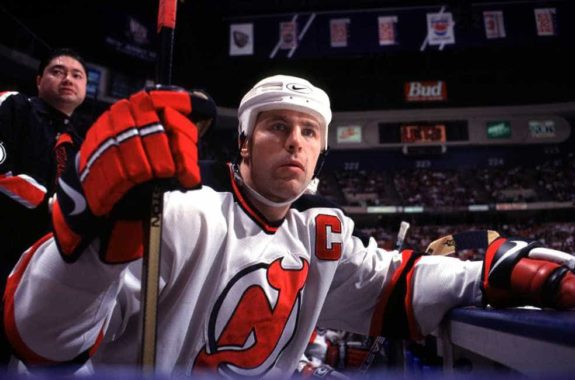
Stevens was not the most vocal leader. Instead, he led with his presence, charisma, and by example. In 2004, he retired after three Stanley Cup wins and a Conn Smythe Trophy (2000). His number 4 is up in the Prudential Center rafters alongside Niedermayer, Daneyko, Patrik Elias, and Martin Brodeur. In 2007, Stevens was inducted into the Hockey Hall of Fame.
Devils Past and Future Legends
Given the defensive nature of the Devils’ style – implemented by coaches Jacques Lemaire, Larry Robinson, and Pat Burns – it’s no wonder some of the greatest club legends are defensemen. Some, like Stevens and Niedermayer, are not just Devils legends but appreciated league-wide.
Without Greene, the Devils no longer have a true leader on defense in Feb. 2020. However, there are up-and-comers of note: At age 25, Damon Severson is already 30th in franchise history with 430 games; Ty Smith and Kevin Bahl (both born in 2000) are defensive prospects with the ability to entertain for years to come.
